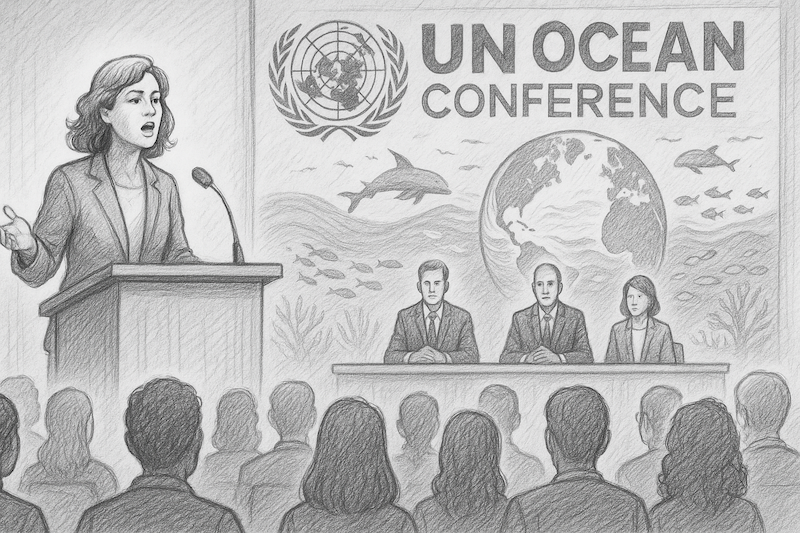What is the UN Ocean Conference (UNOC)?
The UN Ocean Conference is a high-level intergovernmental event organized under the UN framework to drive global action toward Sustainable Development Goal 14—"Life Below Water". Its third edition, held in Nice, France, focused on:
-
Accelerating commitments to protect marine biodiversity.
-
Preventing overfishing and deep-sea mining.
-
Facilitating the operationalisation of the 30x30 pledge under the Convention on Biological Diversity—aiming to protect 30% of the world’s oceans by 2030.
A critical milestone of this conference was pushing forward the ratification of the BBNJ Treaty, agreed upon in 2023 by over 130 nations, which seeks to govern the vast "high seas" beyond national jurisdictions.
What is the Biodiversity Beyond National Jurisdiction (BBNJ) Agreement?
The BBNJ Treaty, also known as the High Seas Treaty, is a historic international agreement under the United Nations Convention on the Law of the Sea (UNCLOS) framework. Its core provisions include:
-
Creation of Marine Protected Areas (MPAs) in international waters.
-
Environmental Impact Assessments (EIAs) before any significant activity in the high seas.
-
Access and benefit-sharing of marine genetic resources, such as enzymes or molecules from deep-sea organisms, which may be used for pharmaceuticals or cosmetics.
-
Capacity-building and transfer of marine technology to developing countries.
Once 60 countries ratify it, a 120-day countdown begins to make the treaty legally binding.
With 56 ratifications secured at UNOC, the world is now just four ratifications away from formally enforcing the treaty.
India and the BBNJ: Where Do We Stand?
While India has not yet ratified the BBNJ, the government has stated that the process is underway. India's position is significant given its vast coastline, strategic presence in the Indian Ocean, and increasing participation in global marine research and conservation. However, India’s ratification would likely hinge on:
-
Ensuring equitable access to marine genetic resources.
-
Balancing conservation and development, particularly in areas such as deep-sea mining and offshore energy.
-
Enhancing domestic capacities in ocean governance, surveillance, and research.
Why is the BBNJ Crucial for the Oceans?
More than two-thirds of the oceans lie beyond national jurisdiction, comprising the high seas. These waters are largely unregulated and subject to overexploitation and pollution. The BBNJ seeks to:
-
Fill the legal vacuum for biodiversity conservation in these areas.
-
Create a formal structure for conducting EIAs and regulating harmful activities like deep-sea mining or bioprospecting.
-
Promote international cooperation in ocean science and capacity-building.
However, challenges remain, particularly in:
-
Disagreements over benefit-sharing from marine genetic resources.
-
Lack of enforcement mechanisms in the absence of a dedicated regulatory body.
-
Technological and financial limitations in monitoring activities in remote ocean areas.
Key Achievements of UNOC 2025
While the BBNJ dominated headlines, several voluntary commitments were also announced at UNOC:
-
European Commission: €1 billion for ocean conservation, science, and sustainable fishing.
-
French Polynesia: Pledged to create the world’s largest Marine Protected Area (~5 million sq. km).
-
New Zealand: Committed $52 million to support Pacific Island ocean governance.
-
Germany: Launched a €100 million program to clear World War-era munitions from the Baltic and North Seas.
-
Panama & Canada-led Coalition: 37 countries joined the High Ambition Coalition for a Quiet Ocean to reduce ocean noise pollution.
-
Canada: Contributed $9 million to support coastal resilience through the Ocean Risk and Resilience Action Alliance.
-
Spain: Announced five new MPAs, expanding marine protection to 25% of its territory.
-
UN Agencies: Initiated One Ocean Finance to unlock blue economy investments.
The Road Ahead: BBNJ COP and Beyond
The UN hopes to achieve 70 ratifications by September 2025, setting the stage for the first BBNJ Conference of Parties (COP) in late 2026. Much like the annual COPs for climate change, this would allow regular monitoring, negotiations, and adjustments in line with new ocean science data and geopolitical realities.
Yet, concerns persist over the lack of a ban on extractive activities, and over how developing countries will secure equitable access to ocean resources. For now, civil society, scientists, and climate activists continue to push for stronger accountability and financial support for ocean conservation.






